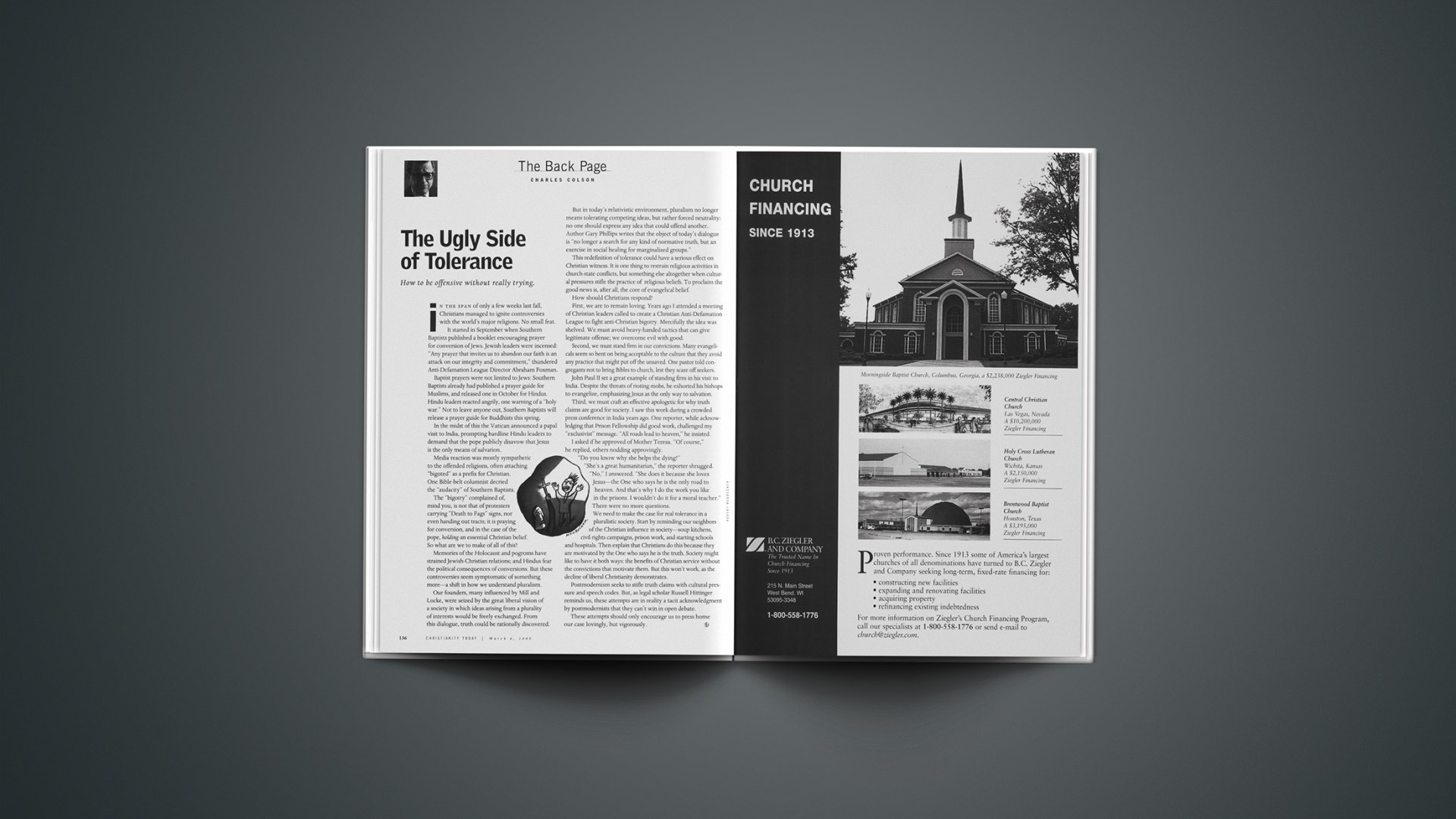In the span of only a few weeks last fall, Christians managed to ignite controversies with the world’s major religions. No small feat.It started in September when Southern Baptists published a booklet encouraging prayer for conversion of Jews. Jewish leaders were incensed: “Any prayer that invites us to abandon our faith is an attack on our integrity and commitment,” thundered Anti-Defamation League Director Abraham Foxman.Baptist prayers were not limited to Jews: Southern Baptists already had published a prayer guide for Muslims, and released one in October for Hindus. Hindu leaders reacted angrily, one warning of a “holy war.” Not to leave anyone out, Southern Baptists will release a prayer guide for Buddhists this spring.In the midst of this the Vatican announced a papal visit to India, prompting hardline Hindu leaders to demand that the pope publicly disavow that Jesus is the only means of salvation.Media reaction was mostly sympathetic to the offended religions, often attaching “bigoted” as a prefix for Christian. One Bible-belt columnist decried the “audacity” of Southern Baptists.The “bigotry” complained of, mind you, is not that of protesters carrying “Death to Fags” signs, nor even handing out tracts; it is praying for conversion, and in the case of the pope, holding an essential Christian belief. So what are we to make of all of this? Memories of the Holocaust and pogroms have strained Jewish-Christian relations; and Hindus fear the political consequences of conversions. But these controversies seem symptomatic of something more—a shift in how we understand pluralism.Our founders, many influenced by Mill and Locke, were seized by the great liberal vision of a society in which ideas arising from a plurality of interests would be freely exchanged. From this dialogue, truth could be rationally discovered.But in today’s relativistic environment, pluralism no longer means tolerating competing ideas, but rather forced neutrality: no one should express any idea that could offend another. Author Gary Phillips writes that the object of today’s dialogue is “no longer a search for any kind of normative truth, but an exercise in social healing for marginalized groups.”This redefinition of tolerance could have a serious effect on Christian witness. It is one thing to restrain religious activities in church-state conflicts, but something else altogether when cultural pressures stifle the practice of religious beliefs. To proclaim the good news is, after all, the core of evangelical belief.How should Christians respond?First, we are to remain loving. Years ago I attended a meeting of Christian leaders called to create a Christian Anti-Defamation League to fight anti-Christian bigotry. Mercifully the idea was shelved. We must avoid heavy-handed tactics that can give legitimate offense; we overcome evil with good. Second, we must stand firm in our convictions. Many evangelicals seem so bent on being acceptable to the culture that they avoid any practice that might put off the unsaved. One pastor told congregants not to bring Bibles to church, lest they scare off seekers.John Paul II set a great example of standing firm in his visit to India. Despite the threats of rioting mobs, he exhorted his bishops to evangelize, emphasizing Jesus as the only way to salvation.Third, we must craft an effective apologetic for why truth claims are good for society. I saw this work during a crowded press conference in India years ago. One reporter, while acknowledging that Prison Fellowship did good work, challenged my “exclusivist” message. “All roads lead to heaven,” he insisted.I asked if he approved of Mother Teresa. “Of course,” he replied, others nodding approvingly.”Do you know why she helps the dying?””She’s a great humanitarian,” the reporter shrugged.”No,” I answered. “She does it because she loves Jesus—the One who says he is the only road to heaven. And that’s why I do the work you like in the prisons. I wouldn’t do it for a moral teacher.” There were no more questions.We need to make the case for real tolerance in a pluralistic society. Start by reminding our neighbors of the Christian influence in society—soup kitchens, civil-rights campaigns, prison work, and starting schools and hospitals. Then explain that Christians do this because they are motivated by the One who says he is the truth. Society might like to have it both ways: the benefits of Christian service without the convictions that motivate them. But this won’t work, as the decline of liberal Christianity demonstrates. Postmodernism seeks to stifle truth claims with cultural pressure and speech codes. But, as legal scholar Russell Hittinger reminds us, these attempts are in reality a tacit acknowledgment by postmodernists that they can’t win in open debate.These attempts should only encourage us to press home our case lovingly, but vigorously.
Related Elsewhere
For another look at tolerance, see the January 11, 1999 cover story of our print magazine, “Are You Tolerant? (Should You Be?) | Deconstructing the gospel of tolerance.”ChristianityToday.com has run several articles on the criticism surrounding Southern Baptists’ recent evangelistic efforts. The latest article, “Can I Get a Witness?” (Jan. 14, 2000) summarizes much of the debate.Charles Colson’s earlier columns include:
- Scout’s Dishonor, November 15, 1999
- What Are We Doing Here?, October 4, 1999
- How Evil Became Cool, August 9, 1999
- Does Kosovo Pass the Just-War Test?, May 24, 1999
- Why We Should Be Hopeful, April 26, 1999
- Moral Education After Monica, March 1, 1999
- The Sky Isn’t Falling, January 11, 1999
- Poster Boy for Postmodernism, November 16, 1998
- Evangelicals Are Not an Interest Group, October 5, 1998
- The Devil in the DNA, August 10, 1998
- The Oxford Prophet, June 15, 1998
- Why Fidelity Matters, April 27, 1998
- Do We Love Coke More Than Justice?, March 2, 1998
- Madison Avenue’s Spiritual Chic, January 12, 1998
- Colson Archives
Colson’s daily radio program, Breakpoint, is also available online.
Copyright © 2000 Christianity Today. Click for reprint information.










